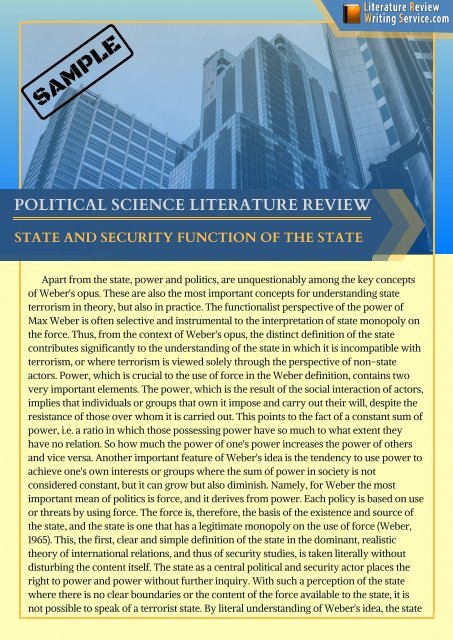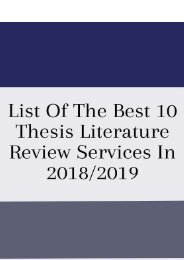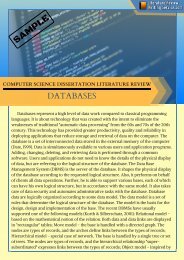Sample Political Science Literature Review
Hi! Here is an outstanding sample political science literature review. For more samples visit https://www.literaturereviewwritingservice.com/a-guide-writing-a-political-science-literature-review/
Hi! Here is an outstanding sample political science literature review. For more samples visit https://www.literaturereviewwritingservice.com/a-guide-writing-a-political-science-literature-review/
Create successful ePaper yourself
Turn your PDF publications into a flip-book with our unique Google optimized e-Paper software.
SAMPLE<br />
POLITICAL SCIENCE LITERATURE REVIEW<br />
STATE AND SECURITY FUNCTION OF THE STATE<br />
Apart from the state, power and politics, are unquestionably among the key concepts<br />
of Weber's opus. These are also the most important concepts for understanding state<br />
terrorism in theory, but also in practice. The functionalist perspective of the power of<br />
Max Weber is often selective and instrumental to the interpretation of state monopoly on<br />
the force. Thus, from the context of Weber's opus, the distinct definition of the state<br />
contributes significantly to the understanding of the state in which it is incompatible with<br />
terrorism, or where terrorism is viewed solely through the perspective of non-state<br />
actors. Power, which is crucial to the use of force in the Weber definition, contains two<br />
very important elements. The power, which is the result of the social interaction of actors,<br />
implies that individuals or groups that own it impose and carry out their will, despite the<br />
resistance of those over whom it is carried out. This points to the fact of a constant sum of<br />
power, i.e. a ratio in which those possessing power have so much to what extent they<br />
have no relation. So how much the power of one's power increases the power of others<br />
and vice versa. Another important feature of Weber's idea is the tendency to use power to<br />
achieve one's own interests or groups where the sum of power in society is not<br />
considered constant, but it can grow but also diminish. Namely, for Weber the most<br />
important mean of politics is force, and it derives from power. Each policy is based on use<br />
or threats by using force. The force is, therefore, the basis of the existence and source of<br />
the state, and the state is one that has a legitimate monopoly on the use of force (Weber,<br />
1965). This, the first, clear and simple definition of the state in the dominant, realistic<br />
theory of international relations, and thus of security studies, is taken literally without<br />
disturbing the content itself. The state as a central political and security actor places the<br />
right to power and power without further inquiry. With such a perception of the state<br />
where there is no clear boundaries or the content of the force available to the state, it is<br />
not possible to speak of a terrorist state. By literal understanding of Weber's idea, the state
POLITICAL SCIENCE LITERATURE REVIEW/<br />
STATE AND SECURITY FUNCTION OF THE STATE<br />
is allowed a lot, and perhaps everything. Deeper consideration of Weber's character<br />
and works can be said with certainty that Weber's vision of the state was not a state of<br />
unlimited power, separate from legal and moral practices.<br />
Force unquestionably plays an important role in politics, but there are different modes<br />
of use and limitation of force by the state itself. Hence, if a state uses force or<br />
intimidates it, if that same force emerges from the framework of the rule, that is<br />
political, legal and moral, and if it seeks to achieve this political goal, we argue that it is a<br />
rift between normative and empirical. Terrorism is an organized use of force and<br />
violence or threats by using violence that through the intentional spread of fear or<br />
terror, based on anticipated reactions of widespread psychological effects, strives to<br />
achieve political goals. The state can also find the role of sponsorship of such a force,<br />
which also exits the framework of its norms. Many thinkers have left their theoretical<br />
space for the terrorist action of states in their deliberations.<br />
Even in the 17th century some of the most important European thinkers considered<br />
security as the basic function of the state, and so too the very emergence and<br />
development of the state were observed through the prism of security. The root of the<br />
word security comes from Latin securus, and in translation there are several different<br />
variants such as "carefree", "reliable" and "safe". A society without security leads to an<br />
uncertain state, so it is no surprise that every state seeks to make its individuals, and<br />
thus society, safe. Her endeavors extend both internally and externally and as far as<br />
essential relationships within the society of a state are equally important to relations<br />
with and between states as well. To achieve this goal, the states have set and still come<br />
forward for the various strategies and tactics available to them, including by force and<br />
force. Interestingly, the paradigm is that safety as beauty - a subjective and elastic term<br />
that signifies "no more or less than what a subject who speaks about it" Williams (2008,<br />
p. 1). In other words, beauty and security are also in the eye of the observer. Anyway,<br />
ontological and epistemological security discussions are not the subject of this work,<br />
but to understand the issues we are dealing with, it should be emphasized that security<br />
is a social construct that often has different meanings for different individuals, societies,<br />
states, supranational associations and other actors.<br />
For example, comparing security in Israel and Andorra or Iraq and Switzerland<br />
means comparing qualitatively but also quantitatively, very different phenomena that<br />
encompass a wide range of meanings for the states and societies of the mentioned<br />
countries. Security is a feeling and a state, but security is both a process and an activity.<br />
This is a variable category whose quality and quantity varies. Security can be<br />
influenced by numerous threat factors, so the ability to overcome these threats is<br />
threatened. Looking at security as an activity, there is a double relationship, one<br />
concerning man and man, and the other concerning man and nature. In order for this<br />
activity to be successful, especially in the modern world when humanity is at a high<br />
level of development, strong interconnectedness, and therefore equal and numerous<br />
sources of threat which simultaneously threaten many and sometimes all, security must<br />
be a meaningful and aware activity focused on the preservation of societies and<br />
individuals.
POLITICAL SCIENCE LITERATURE REVIEW/<br />
STATE AND SECURITY FUNCTION OF THE STATE<br />
Here it is worth highlighting the fact that there are different views on security, i.e.<br />
different schools within the framework of the theory of international relations as well<br />
as a rough division on a traditional and modern security watch. By the traditional view,<br />
security is viewed predominantly through the prism of the state's military power and<br />
the state's power to preserve and / or increase the level of security of its citizens. This is<br />
a so-called realistic approach to international relations, according to which the state is a<br />
central security actor, and the force is a constant and irreplaceable factor that depends<br />
on the development of the state, but also of the world. According to the standpoint of<br />
this course, based on Edward H. Carr and Hans Morgenthau, or by representatives of<br />
"classic realism" (Jorgensen, 2010, p. 80), the state can only exercise its interests by<br />
force, and above all the interest is a national interest. This position is extremely<br />
important for understanding the subject of state terrorism and, therefore, it should be<br />
borne in mind that the realistic perception of security was dominant throughout the<br />
20th century, and today this direction plays an important role in the sphere of<br />
international relations. In addition to the military sphere and force, security has<br />
expanded to four other important areas - economic, political, social and ecological<br />
(Buzan, 2009, p. 107 - 119). As levels and areas are interconnected, and therefore<br />
interdependent. Barry Buzan introduced his ideas of expanding and deepening security<br />
for the first time in 1991, in the unavoidable Security People, States and Fear, which had<br />
a significant impact on security studies, and in particular on understanding and trying<br />
to define national security. Apart from Buzan's sectoral security expansion, another<br />
concept from the factory of the so-called Copenhagen School is remarkably significant<br />
in the new (critical) concept of security, which is the "securitization" of Ole Wæver's<br />
author. He argued that security can be viewed as a "speech act" (Wæver, 2011, p. 468).<br />
Securitization is a social process where a certain issue, phenomenon or problem is<br />
identified as a security problem. Discursive practices of social actors are key in the<br />
political and social constructions of security.<br />
REFERENCES<br />
Weber, M. (1965). Politics as a vocation. Philadelphia: Fortress Press.<br />
Williams, D. P. (2008). Security Studies: An Introduction, in Paul D. Williams (ed.)<br />
Security Studies: An Introduction. London and New York: Routledge, Taylor &<br />
Francis Group. 1-12.<br />
Jorgensen, K. E. (2010). International Relations Theory. Basingstoke: Palgrave<br />
Macmillan.<br />
Buzan, B. (2009) People, States and Fear: An agenda for International Security<br />
Studies in the Post-Cold War Era. Colchester: ECPR Press.<br />
Wæver, O. (2011). Politics, Security, Theory. Security Dialogue, 42 (4-5), 465-480.












